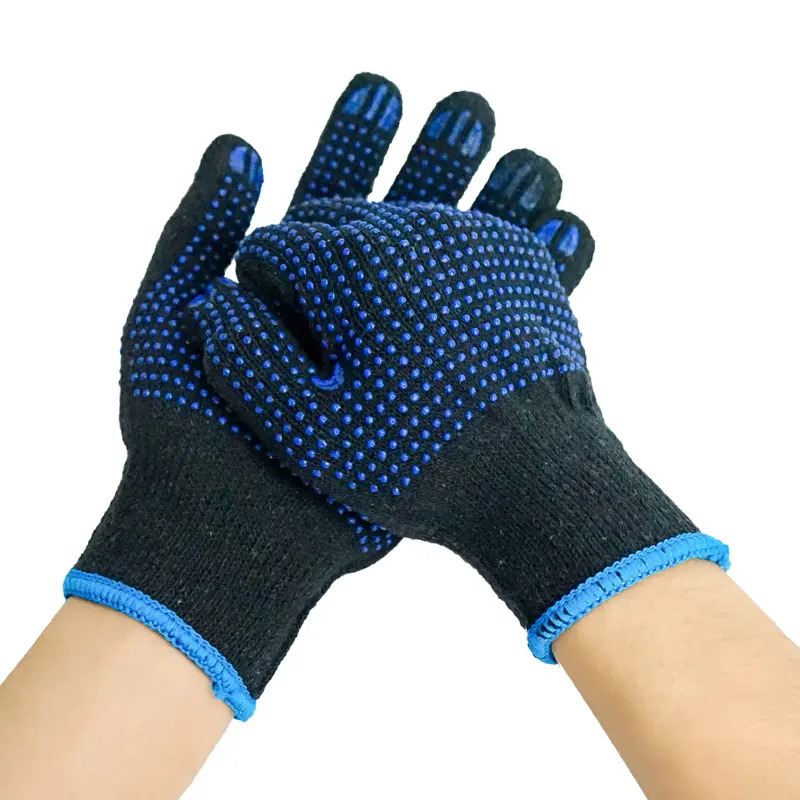Sarung tangan kerja khusus sangat penting untuk industri yang membutuhkan perlindungan tangan, seperti konstruksi, manufaktur, logistik, dan pergudangan. Sarung tangan kerja khusus memberi perusahaan fitur keselamatan yang lebih baik, kenyamanan yang lebih baik, dan merek yang dipersonalisasi - kualitas yang tidak ditemukan dalam solusi siap pakai - yang menjadikannya investasi yang bagus untuk perlindungan pekerja dan pengenalan merek.

Memilih sarung tangan kerja khusus yang tepat membutuhkan lebih dari sekadar memilih penutup perlindungan dasar. Keampuhan sarung tangan dalam berbagai situasi kerja sangat bergantung pada berbagai elemen seperti komposisi bahan, sertifikasi keselamatan, kekuatan cengkeraman, ketahanan terhadap sayatan, dan perlindungan termal. Selain itu, menyertakan fitur desain yang khas, kode warna, dan logo yang dipesan lebih dahulu akan memungkinkan perusahaan menampilkan tampilan staf yang lebih profesional dan terpadu.
Tutorial ini akan membahas bahan terbaik untuk sarung tangan kerja khusus, standar keselamatan industri utama, pilihan merek, dan masalah pemesanan dalam jumlah besar. Dengan mengetahui faktor-faktor ini, Anda dapat membuat pilihan yang bijak, apakah bisnis Anda ingin meningkatkan alat pelindung diri atau mencari pendekatan yang murah untuk promosi merek.
1. Memilih Bahan yang Tepat untuk Sarung Tangan Kerja Khusus
Keselamatan, kenyamanan, dan daya tahan pekerja semuanya bergantung pada bahan yang tepat yang digunakan untuk sarung tangan kerja khusus. Industri, lingkungan kerja, dan bahaya tertentu yang dihadapi pekerja akan memengaruhi bahan yang dipilih. Setiap bahan memiliki keunggulan khusus, mulai dari lapisan nitril yang tahan air hingga Kevlar yang tahan potong. Dengan mengetahui bahan-bahan ini, perusahaan dapat memilih sarung tangan terbaik untuk karyawannya.
Kulit: Daya Tahan dan Perlindungan Klasik
Terkenal dengan daya tahan, fleksibilitas, dan ketahanan terhadap abrasi, kulit merupakan salah satu bahan yang paling konvensional dan dapat diandalkan untuk sarung tangan kerja. Untuk operasi industri biasa, pengelasan, dan bangunan, bahan ini sempurna karena menawarkan cengkeraman yang luar biasa dan pertahanan terhadap permukaan yang kasar. Berbagai bentuk kulit memberikan tingkat perlindungan yang berbeda:
- Kulit sapi: Tebal dan tahan lama, menawarkan perlindungan superior terhadap lecet.
- Kulit kambing: Mempertahankan daya tahan, lebih lembut dan lebih fleksibel, meningkatkan ketangkasan.
- Kulit babi: Cocok untuk situasi lembab karena itu agak lapang dan tahan lembab.
Sarung Tangan Berlapis Nitril: Tahan Bahan Kimia dan Minyak
Sarung tangan berlapis nitril memberikan perlindungan yang lebih baik bagi mereka yang bekerja di sektor yang menangani minyak, bahan kimia, dan permukaan yang licin. Sempurna untuk sektor otomotif, penanganan bahan kimia, dan medis, nitril tahan terhadap tusukan, minyak, dan banyak bahan kimia. Sarung tangan ini juga memberikan cengkeraman yang kuat, memastikan keselamatan dan efisiensi pekerja, bahkan saat menangani bahan basah atau berminyak.
Sarung Tangan Berlapis Lateks: Cengkeraman dan Fleksibilitas yang Kuat
Untuk pekerjaan yang membutuhkan ketangkasan dan cengkeraman yang tinggi, sarung tangan berlapis lateks cukup umum digunakan. Sarung tangan ini sangat cocok untuk penanganan material, pekerjaan di gudang, dan konstruksi karena sesuai dengan bentuk tangan. Namun, beberapa karyawan mungkin memiliki sensitivitas terhadap lateks, oleh karena itu perusahaan harus mempertimbangkan pengganti nitril jika diperlukan.
Kain Kevlar dan Kain Tahan Potong: Keamanan Maksimum untuk Pekerjaan Berisiko Tinggi
Sarung tangan tahan potong yang tinggi digunakan dalam pengerjaan logam, penanganan kaca, dan manufaktur di antara sektor lainnya. Perlindungan luar biasa yang dikombinasikan dengan fleksibilitas berasal dari Kevlar dan kain tahan potong lainnya. Kevlar juga tahan panas, sehingga cocok untuk bidang-bidang yang mencakup permukaan panas, pengelasan, dan operasi listrik.
Sarung Tangan Musim Dingin dan Termal: Perlindungan dalam Suhu Ekstrem
Sarung tangan kerja berinsulasi memberikan kehangatan tanpa mengorbankan ketangkasan bagi karyawan dalam cuaca ekstrem, penyimpanan dingin, dan konstruksi luar ruangan. Sering kali dilengkapi lapisan bulu domba atau teknologi Thinsulate, sarung tangan termal membantu menjaga tangan tetap hangat sekaligus menjamin cengkeraman dan fleksibilitas yang kuat.
Bahan sarung tangan kerja khusus yang optimal akan bergantung pada ancaman dan persyaratan tempat kerja tertentu. Sarung tangan Kevlar menjamin ketahanan terhadap luka potong untuk area berisiko tinggi; sarung tangan nitril melindungi dari bahan kimia; sarung tangan kulit memberikan ketahanan dan ketahanan terhadap abrasi. Memilih bahan yang sesuai akan meningkatkan keselamatan pekerja, hasil kerja, dan kenyamanan secara umum, sehingga sarung tangan kerja yang disesuaikan merupakan pembelian yang tepat bagi setiap perusahaan. Jika Anda tidak yakin sarung tangan khusus mana yang sesuai dengan bisnis Anda, berbicara dengan tim kami untuk menemukan yang paling cocok.
2. Memahami Standar Keselamatan untuk Sarung Tangan Kerja
Sama pentingnya dengan memilih bahan yang tepat adalah memastikan sarung tangan kerja khusus memenuhi kriteria keselamatan industri. Aturan keselamatan memungkinkan perusahaan untuk memberikan perlindungan tangan yang cukup, sehingga mengurangi cedera akibat kerja dan menjamin kepatuhan hukum. Mengetahui sertifikasi penting seperti ANSI, EN 388, dan peraturan OSHA membantu perusahaan memilih sarung tangan yang sesuai dengan bahaya dan persyaratan keselamatan di sektor mereka.
Tingkat Ketahanan Potong ANSI: Perlindungan Terhadap Benda Tajam
Peringkat keamanan untuk sarung tangan tahan potong ditetapkan oleh American National Standards Institute (ANSI), yang memandu perusahaan mengenai tingkat perlindungan yang dibutuhkan. Dari A1 (perlindungan ringan) hingga A9 (ketahanan terpotong tertinggi), skala ANSI berjalan:
- A1-A3: Sempurna untuk penanganan umum dan operasi gudangmenawarkan ketahanan terhadap luka ringan.
- A4-A6: Menyediakan ketahanan potong sedang hingga tinggisesuai untuk konstruksi, penanganan kaca, dan sektor otomotif.
- A7-A9: Dirancang untuk fabrikasi logam, industri berat, dan area berisiko tinggi, menawarkan perlindungan maksimal.
Sertifikasi EN 388: Mengevaluasi Ketahanan terhadap Abrasi, Potong, dan Tusukan
Standar EN 388 Eropa adalah tolok ukur utama untuk perlindungan mekanis bagi perusahaan multinasional. Penilaian EN 388 mengevaluasi:
- Ketahanan abrasi (skala 1-4): Mengukur seberapa efektif sarung tangan menahan gesekan dan permukaan yang kasar.
- Ketahanan potong (skala 1-5 atau A-F): Menentukan perlindungan terhadap benda tajam.
- Ketahanan sobek (skala 1-4): Menunjukkan sarung tangan daya tahan di bawah beban peregangan.
- Resistensi terhadap tusukan (skala 1-4): Menilai resistensi terhadap penetrasi benda tajam.
Tahan Panas dan Bahan Kimia: Perlindungan Khusus
Bisnis tertentu memerlukan sarung tangan kerja dengan ketahanan khusus terhadap bahan kimia berbahaya dan suhu tinggi. Perusahaan yang bergerak di bidang perdagangan seperti pemrosesan bahan kimia, pengecoran, dan pengelasan harus mencarinya:
- Sarung tangan tahan panas: Biasanya terdiri dari Kevlar atau bahan yang dilapisi alumuniumini melindungi pekerja dari luka bakar dan paparan suhu tinggi.
- Sarung tangan tahan bahan kimia: Terbuat dari nitril, neoprena, atau lateksmereka melindungi kulit dari bahan kimia kaustik, minyak, dan cairan berbahaya.
Kepatuhan terhadap OSHA: Peraturan Keselamatan di Tempat Kerja
Menetapkan aturan keselamatan di tempat kerja, Administrasi Keselamatan dan Kesehatan Kerja (OSHA) mengamanatkan agar perusahaan menyediakan alat pelindung diri yang sesuai bagi pekerja dalam kondisi berbahaya, termasuk sarung tangan kerja. Kepatuhan memastikan perusahaan terhindar dari hukuman, tuntutan hukum, dan cedera pekerja. Manajer harus melakukannya:
- Melakukan analisis bahaya untuk mengidentifikasi risiko di tempat kerja.
- Sediakan sarung tangan dengan nilai yang benar untuk tugas pekerjaan tertentu.
- Melatih anggota staf pada yang tepat penggunaan dan perawatan sarung tangan.
Memilih sarung tangan kerja khusus yang memenuhi sertifikasi keselamatan yang diperlukan menjamin perlindungan tangan yang unggul, peningkatan keselamatan di tempat kerja, dan kepatuhan terhadap peraturan. Dengan mengetahui tingkat potongan ANSI, nilai EN 388, dan pedoman OSHA, perusahaan dapat menyediakan sarung tangan yang menawarkan kenyamanan dan perlindungan terbaik bagi karyawan. Membeli sarung tangan kerja premium yang sesuai akan mengurangi bahaya, meningkatkan produktivitas, dan menjaga pekerja tetap aman di tempat kerja yang penuh tuntutan.

3. Pencitraan Merek & Kustomisasi: Meningkatkan Visibilitas dan Loyalitas Karyawan
Sarung tangan kerja khusus adalah alat yang hebat untuk pencitraan merek dan lebih dari sekadar perlindungan dan keselamatan. Bisnis dapat memperkuat identitas merek mereka dan memastikan anggota staf merasa dihargai dengan memasukkan logo, desain berkode warna, dan elemen yang disesuaikan. Kustomisasi juga membantu membedakan jenis sarung tangan untuk peran pekerjaan tertentu, meningkatkan organisasi dan efisiensi di tempat kerja.
Sablon & Bordir: Visibilitas Logo yang Tahan Lama
Termasuk lambang perusahaan adalah salah satu cara termudah untuk mempersonalisasi sarung tangan kerja.
- Sablon paling cocok untuk logo yang berani dan bersemangat di bagian belakang sarung tangan, memastikan visibilitas yang tinggi tanpa mengorbankan fleksibilitas.
- Bordir menawarkan desain premium dan tahan lama yang tidak akan pudar seiring waktu, membuatnya sempurna untuk sarung tangan mewah atau promosi.
Sarung Tangan Berkode Warna: Meningkatkan Keselamatan & Organisasi
Menggunakan sarung tangan dengan kode warna memungkinkan perusahaan untuk membedakan dengan jelas divisi, peran pekerjaan, atau tingkat keselamatan.
- Sarung tangan berwarna cerah meningkatkan visibilitas di tempat kerja yang berbahaya.
- Warna-warna khusus departemen membantu karyawan dengan cepat memilih sarung tangan yang tepat untuk tugas mereka, sehingga mencegah terjadinya kesalahan.
Kesesuaian dan Ukuran Khusus: Meningkatkan Kenyamanan & Produktivitas
Karyawan yang menggunakan sarung tangan yang tidak pas sering kali mengalami ketidaknyamanan dan penurunan kinerja.
- Persembahan opsi ukuran yang dipersonalisasi memastikan pekerja menerima sarung tangan yang pas, meningkatkan ketangkasan, cengkeraman, dan kenyamanan secara keseluruhan.
- A sarung tangan yang pas juga meningkatkan keamanankarena sarung tangan yang longgar dapat menyebabkan kecelakaan atau ketidakefisienan saat menangani alat.
Logo Reflektif & Desain Visibilitas Tinggi: Keamanan Malam & Cahaya Rendah
Menambahkan logo reflektif atau tanda visibilitas tinggi pada sarung tangan akan meningkatkan keselamatan pekerja untuk industri yang membutuhkan shift malam atau kondisi kerja dengan cahaya rendah. Fitur-fitur ini membantu karyawan terlihat menonjol dalam zona konstruksi, gudang, atau pekerjaan di pinggir jalan, mengurangi risiko kecelakaan.
Menyesuaikan sarung tangan kerja bukan hanya tentang daya tarik estetika-ini memperkuat pengenalan merek, meningkatkan organisasi tempat kerja, dan meningkatkan kepuasan pekerja. Melalui desain dengan kode warna, detail bordir, atau logo sablon, perusahaan dapat mempertahankan standar keselamatan tingkat atas sekaligus menciptakan tenaga kerja yang profesional dan kohesif.Mencari sarung tangan kerja yang digerakkan oleh kinerja? Hubungi kami hari ini untuk menyesuaikan sarung tangan untuk tim dan pengecer.
4. Kiat Pemesanan Massal: Cara Menghemat Biaya dan Memastikan Kualitas
Sarung tangan kerja khusus adalah metode yang bagus bagi perusahaan untuk menjaga keseragaman, memangkas biaya, dan menjamin pasokan yang konsisten. Memesannya dalam jumlah besar akan membantu dalam hal ini. Namun, menjaga kualitas yang baik sekaligus mengendalikan pengeluaran membutuhkan persiapan yang matang. Bisnis harus mempertimbangkan jumlah pesanan minimum (MOQ), kebijakan harga, ketergantungan pemasok, dan jadwal produksi. Efisiensi biaya dan kualitas produk dapat jauh lebih baik dengan memilih produsen yang memiliki reputasi baik dan mengatur pesanan dengan sengaja.
Memahami MOQ dan Harga
Sebagian besar produsen menetapkan jumlah pesanan minimum (MOQ) untuk memaksimalkan efisiensi produksi. Jenis kain, tingkat kesulitan yang disesuaikan, dan volume pesanan semuanya memengaruhi MOQ yang diperlukan. Perusahaan harus menyadari beberapa elemen yang mempengaruhi harga:
Karena bahan premium - seperti kulit, Kevlar, atau sarung tangan bersulam kelas atas - memiliki biaya produksi yang lebih besar, produsen biasanya meminta MOQ yang lebih besar untuk bahan tersebut. Sarung tangan yang terbuat dari nitril, lateks, atau poliester sering kali memiliki MOQ yang lebih rendah untuk perusahaan yang mencari opsi dengan harga terjangkau, sehingga memenuhi syarat untuk perusahaan kecil atau pembeli pertama kali.
Pesanan yang lebih besar sering kali berarti penurunan harga per unit karena banyak vendor memberikan diskon besar-besaran. Perusahaan yang memesan dalam jumlah besar harus menegosiasikan kebijakan harga untuk mengoptimalkan penghematan tanpa mengorbankan kualitas.
Memilih Pemasok yang Dapat Diandalkan
Memilih pemasok yang dapat dipercaya menjamin perusahaan akan kualitas produk yang teratur, pengiriman tepat waktu, dan dukungan pelanggan yang penuh perhatian. Bisnis harus memberikan prioritas utama kepada produsen yang menawarkan: prioritas utama.
Sebelum produksi massal, proses pengambilan sampel mengevaluasi kualitas sarung tangan secara umum, pencetakan logo, dan daya tahan kain. Agar sesuai dengan kebutuhan branding, vendor yang andal juga menyediakan alternatif penyesuaian yang luas seperti sablon, bordir, kode warna, dan pemilihan bahan.
Catatan penyedia dalam mengelola pesanan dalam jumlah besar juga sama pentingnya. Sebelum memutuskan aliansi jangka panjang, perusahaan harus memeriksa peringkat konsumen, kapasitas produksi, dan kepatuhan terhadap standar industri.
Waktu Tunggu Produksi dan Logistik
Pembuatan sarung tangan kerja khusus dalam jumlah besar biasanya membutuhkan waktu 3-6 minggu, tergantung pada jumlah pesanan dan tingkat kesulitan penyesuaian. Khusus untuk promosi musiman, seragam perusahaan, atau peluncuran alat keselamatan industri, perusahaan harus membeli jauh-jauh hari untuk menjamin pengiriman yang cepat.
Beberapa produsen menyediakan layanan pesanan terburu-buru untuk kebutuhan mendesak, bahkan jika itu bisa menjadi biaya tambahan. Khususnya pada saat-saat permintaan tinggi, perusahaan yang melakukan pembelian secara internasional juga harus mempertimbangkan jadwal pengiriman, bea cukai, dan kemungkinan penundaan.
Mempertahankan efisiensi rantai pasokan sambil mengamankan sarung tangan kerja khusus premium dengan harga terjangkau bergantung pada sistem pemesanan massal yang terorganisir dengan baik. Perusahaan dapat memaksimalkan kontrol inventaris, menurunkan biaya, dan meningkatkan konsistensi merek dengan mengetahui MOQ dan harga, memilih pemasok yang dapat diandalkan, dan mengelola jadwal produksi dengan benar. Berinvestasi dalam sarung tangan kerja yang dipersonalisasi dalam skala besar adalah langkah yang diperhitungkan yang meningkatkan penghematan biaya umum, kesadaran merek, dan keselamatan kerja.nama-nama timpenting untuk memilih yang tepat teknik pencetakan atau bordir berdasarkan bahan sarung tangan. Perlu panduan ahli dalam memilih sarung tangan terbaik untuk bisnis Anda? Bicaralah dengan tim kami hari ini untuk solusi yang disesuaikan.
Pikiran Akhir
Membeli sarung tangan kerja yang dipersonalisasi adalah langkah yang diperhitungkan untuk meningkatkan kenyamanan pekerja, mengembangkan identifikasi merek, dan memperkuat perlindungan kerja - tidak hanya tindakan pencegahan keselamatan. Dari kulit dan nitril hingga Kevlar dan tekstil termal, bahan yang tepat memastikan sarung tangan menawarkan daya tahan dan perlindungan yang diperlukan untuk bisnis tertentu. Pengetahuan tentang sertifikasi keselamatan seperti tingkat ketahanan terhadap luka potong ANSI dan kepatuhan terhadap EN 388 memungkinkan perusahaan untuk memenuhi persyaratan hukum dan mencegah bahaya pekerjaan.
Selain kegunaan, pencetakan reflektif, desain kode warna, dan logo bordir-yang menawarkan profesionalisme dan eksposur merek di tempat kerja-memiliki daya penyesuaian. Pesanan massal dari pemasok yang andal memberikan pengiriman yang cepat, kualitas yang konsisten, dan penghematan biaya, sehingga memungkinkan perusahaan untuk mengontrol persediaan mereka dengan baik.
Bidang keahlian kami di Modenly adalah menciptakan sarung tangan kerja premium yang dipersonalisasi untuk berbagai sektor. Apakah pekerjaan Anda membutuhkan sarung tangan untuk pabrik, gudang, lokasi bangunan, atau pekerjaan di luar ruangan, kami memiliki pilihan yang kuat, harga terjangkau, dan mudah beradaptasi. Dapatkan penawaran dengan menghubungi kami sekarang juga untuk meningkatkan branding dan keamanan dalam bisnis Anda!

